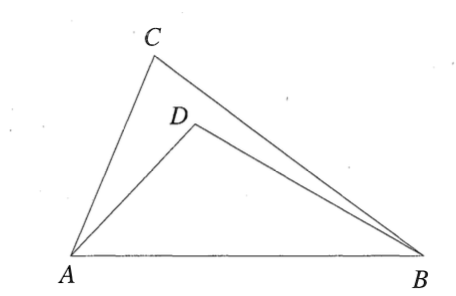It’s time for a brain teaser:
There is a triangle , and
is an arbitrary interior point of this triangle (see Fig. 1). Prove that
.

Fig. 1
Here is my solution:
Extend line to point
on
(see Fig. 2),

Fig. 2
we have
My solution relies on a well known theorem:
Given a triangle ABC, the sum of the lengths of any two sides is greater than the length of the third side.
In the words of Euclid:

“In any triangle two sides taken together in any manner are greater than the remaining one” (The Elements: Book I: Proposition 20)
I have conjured up the following algebraic proof of Euclid’s proposition:
Any can be put in a rectangular coordinate system where
(see Fig. 3)

Fig. 3
It follows that